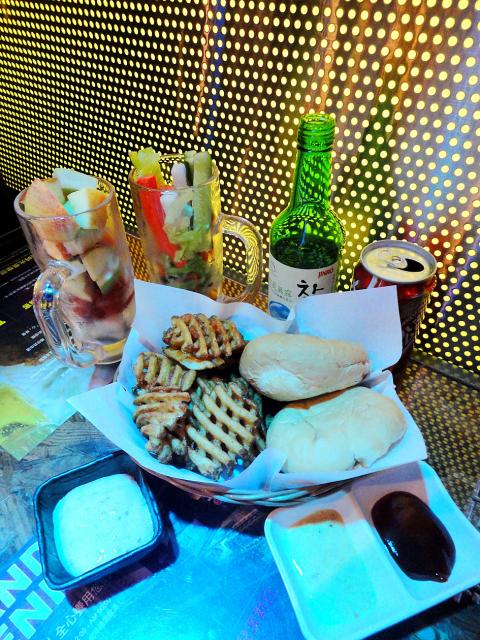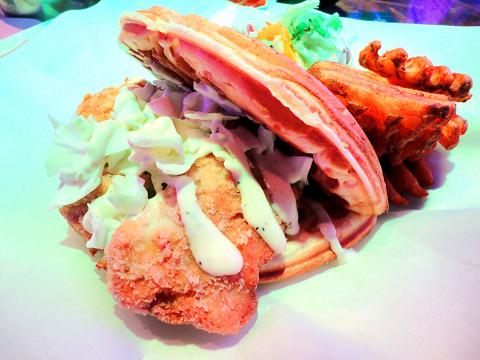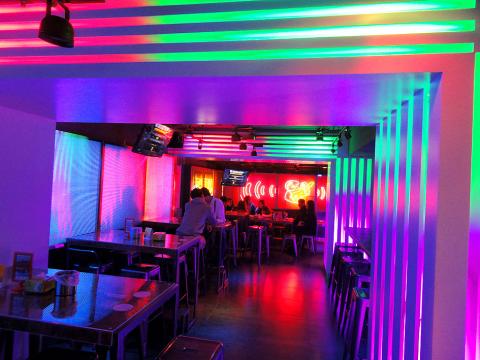East District is the city’s most exuberant area, where you can spot the newest trends in fashion, design, dining and clubbing. A fresh addition to the bustling lanes of Zhongxiao East Road (忠孝東路) screams its presence with dynamic lighting, loud music and a punchy tag line: chicken and beer.
Welcome to TKK The Bar, a new expansion project of the local fast food chain T.K.K. Fried Chicken (頂呱呱).
It’s a gastropub that serves a variety of fried chicken, fries, salads, waffles and alcoholic drinks. Since its grand opening last month, the new endeavor has enjoyed a quick table turnover rate powered by a clientele that is young and hip.

Phopto: Tang Hsiang-yi, Taipei Times
I hadn’t planned to go, but strolling by the glowing box with a friend by chance, I was drawn in by its flashy LED lights.
Just in case the T.K.K. Fried Chicken chain doesn’t ring a bell, it’s a local business founded in the 1970s as an alternative to imported fast food brands like KFC and McDonald’s.
At first glance, TKK The Bar struck me as a brand-new establishment that shares nothing with the chain. The decorative touches of the old-fashioned fast food chain did not make an appearance in this cool, modern-looking bar restaurant.

Photo: Tang Hsiang-yi, Taipei Times
But to my disappointment, the food at TKK The Bar is less impressive than its ambience. The bar menu presents what the fast food chain offers — the usual chicken necks (NT$180), chicken drumsticks (NT$250) and roasted half chicken (NT$349) — with few innovations of its own.
One of the few new items is the fried chicken waffle sandwich (served with a mini salad and waffle fries for NT$210). We ordered the sandwich out of curiosity, and it came just as it sounds: It’s a piece of lemon-flavored chicken chop dressed with morsels of chopped cabbage and sandwiched in a waffle. The citrus flavor of the chicken leaves a zesty aftertaste, but other than that, the dish provided nothing out of the ordinary.
Other items we ordered included the mini pizza buns (an order of two served with assorted fries for NT$180), veggie sticks (NT$80) and an assorted fruit box (NT$100).

Photo: Tang Hsiang-yi, Taipei Times
At T.K.K. Fried Chicken, the mini pizza is my preferred snack — the pocket-sized pizza-in-a-bun warms up a stomach in need of a quick refill. However, having it in a gastropub proved less delightful. Especially when I know one bun costs only NT$45 at the fast food restaurant. The bun at the bar cost more but tasted exactly the same, though it came arranged in a better-looking basket instead of a paper bag.
Both the veggie sticks and fruits came in beer glasses with Thousand Island dipping sauce on the side. The veggies were cucumber, carrot and radish sticks mingled with lettuce and bell pepper slices, while the fruit box comprised morsels of guava, apple and cherry tomatoes. Everything tasted banal.
Still, the merely-average food quality didn’t seem to stop customers from coming, which suggests to me that people don’t go there for the chicken. Instead, TKK The Bar is where friends meet, sit down for a beer and maybe some finger food — even when the volume of dance remixes playing in the bar would definitely prevent diners from having a conversation.
For thirsty diners, the drink menu offers plenty of reasonably-priced options. The selection includes a Taiwanese draft (NT$120), Japanese Kirin draft (NT$150), Thai Singha beer (NT$120) and Korean Hite (NT$120). There’s also a list of Japanese sawa drinks and fun cocktails based on creme de cassis. We picked a bottle of Korean Chamisul Soju (NT$250).
■ Excessive consumption of alcohol can damage your health.

In the March 9 edition of the Taipei Times a piece by Ninon Godefroy ran with the headine “The quiet, gentle rhythm of Taiwan.” It started with the line “Taiwan is a small, humble place. There is no Eiffel Tower, no pyramids — no singular attraction that draws the world’s attention.” I laughed out loud at that. This was out of no disrespect for the author or the piece, which made some interesting analogies and good points about how both Din Tai Fung’s and Taiwan Semiconductor Manufacturing Co’s (TSMC, 台積電) meticulous attention to detail and quality are not quite up to

April 21 to April 27 Hsieh Er’s (謝娥) political fortunes were rising fast after she got out of jail and joined the Chinese Nationalist Party (KMT) in December 1945. Not only did she hold key positions in various committees, she was elected the only woman on the Taipei City Council and headed to Nanjing in 1946 as the sole Taiwanese female representative to the National Constituent Assembly. With the support of first lady Soong May-ling (宋美齡), she started the Taipei Women’s Association and Taiwan Provincial Women’s Association, where she

Chinese Nationalist Party (KMT) Chairman Eric Chu (朱立倫) hatched a bold plan to charge forward and seize the initiative when he held a protest in front of the Taipei City Prosecutors’ Office. Though risky, because illegal, its success would help tackle at least six problems facing both himself and the KMT. What he did not see coming was Taipei Mayor Chiang Wan-an (將萬安) tripping him up out of the gate. In spite of Chu being the most consequential and successful KMT chairman since the early 2010s — arguably saving the party from financial ruin and restoring its electoral viability —

It is one of the more remarkable facts of Taiwan history that it was never occupied or claimed by any of the numerous kingdoms of southern China — Han or otherwise — that lay just across the water from it. None of their brilliant ministers ever discovered that Taiwan was a “core interest” of the state whose annexation was “inevitable.” As Paul Kua notes in an excellent monograph laying out how the Portuguese gave Taiwan the name “Formosa,” the first Europeans to express an interest in occupying Taiwan were the Spanish. Tonio Andrade in his seminal work, How Taiwan Became Chinese,